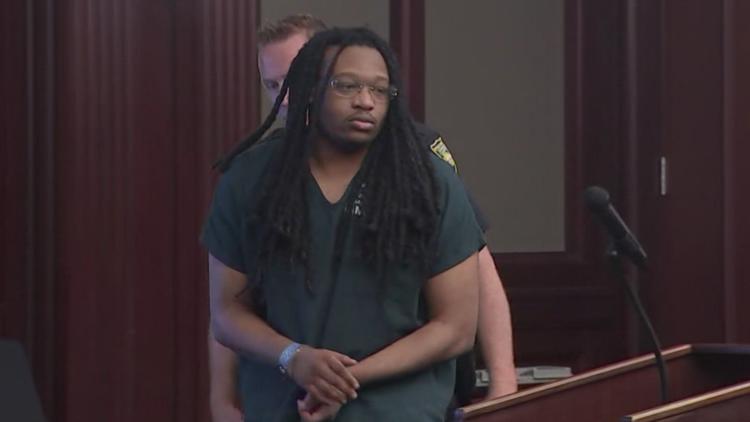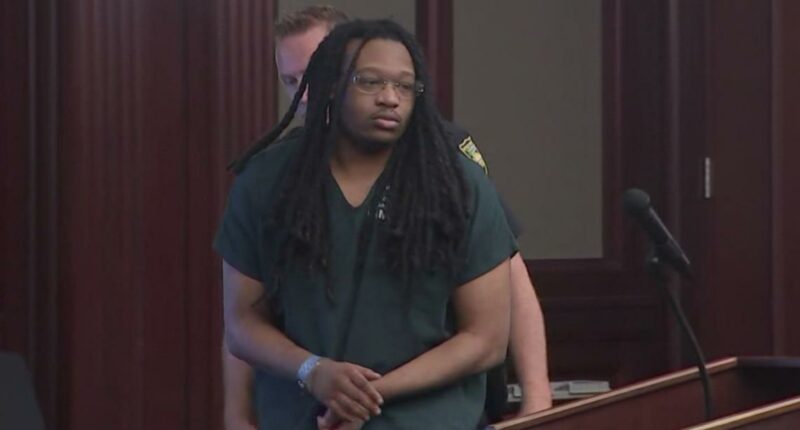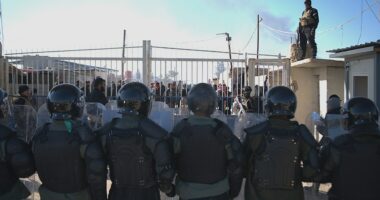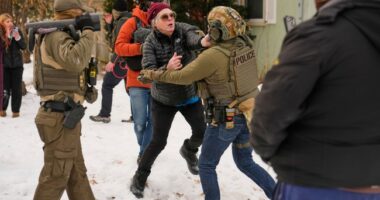Share this @internewscast.com

The rapper, whose real name is Hakeem Robinson, was convicted in July of first-degree murder in the 2020 death of Charles McCormick.
JACKSONVILLE, Fla. — Jacksonville rapper Ksoo, who was found guilty of first-degree murder in July, was denied a request for a new trial in Duval County court on Tuesday afternoon.
Following the presentation of arguments by the rapper’s defense team for a new trial, Judge Tatiana Salvador scheduled his sentencing for September 19 at 10 a.m. Under Florida law, first-degree murder is classified as a capital felony, meaning Ksoo will face a life sentence.
On July 31, the rapper whose real name is Hakeem Robinson, was convicted of murder in the January 2020 death of Charles McCormick.
Prosecutors said Robinson gunned down McCormick as he walked out of a temp agency on Merrill Road on Jan. 15, 2020.
The killing was driven by the death of Robinson’s stepbrother, Willie Addison, who was shot outside a club exactly one year before McCormick’s murder. Both Robinson and his co-defendant Leroy Whitaker are known members of the Jacksonville gang ATK, while Addison was killed by someone from 6block, a rival gang. Prosecutors stated that McCormick was associated with 6block.
According to prosecutors, McCormick created a “diss track” mocking Addison’s death, which not only resulted in his demise but also severely injured Robinson’s father, brother, and cousin.
This provoked Robinson to kill McCormick, as explained by the prosecution. The state described a scenario where Robinson, Whitaker, and their accomplice Dominique Barner plotted against McCormick. Robinson was reportedly captured on video shooting McCormick, with Whitaker in the getaway car armed and ready to fire.
In a motion requesting a new trial, Robinson’s attorneys listed the five following reasons why the rapper should be granted one:
- Admission of highly prejudicial iCloud notes
- Recanted testimony of Officer Collins
- Misuse of state demonstratives and improper expert testimony
- Uneven utilization of demonstratives during voir dire
- Procedural compliance and request for evidentiary hearing
Robinson’s defense countered by arguing that iCloud notes found on Robinson’s phone, which allude to unrelated violent acts, were created before McCormick’s “diss track” was released.
“The content was highly inflammatory, unrelated to the charges, and offered minimal probative value,” Robinson’s attorneys stated in the motion. “Its admission likely influenced the jury to convict based on emotion rather than the evidence presented, depriving Mr. Robinson of a fair trial.”
Throughout Robinson’s trial, his attorneys argued multiple times the difference in stature between the shooter and Robinson, saying the rapper was taller and weighed more.
In the motion, Robinson’s attorneys said Officer Jimmy Collins, who chased shooter, changed his description of the shooter’s height from 5’5-5’9 to “closer to his height of 6’4” during testimony at trial.
The rapper’s attorneys said the state failed to inform them before trial that Collins had changed his description of the shooter. And although a Richardson hearing was conducted on the matter, finding it to be inadvertent and not prejudicial, Robinson’s attorneys said the finding ignores “Florida law and the trial realties.”
“Here, the defense prepared for years to highlight the stark contrast between Officer Collins’ original description and and Mr. Robinson’s actual stature,” the motion states. “By learning of the changed testimony only during trial, the defense lost the opportunity to: Investigate why Collins altered his account after reviewing the video, secure expert testimony on perception and memory, emphasize the original description in opening statements, and develop impeachment grounded in pretrial investigation. This was not harmless. The change erased one of the defense’s most powerful exculpatory points and instead bolstered the State’s identification theory.”
Robinson’s attorneys further argued that the state used materials like computer scans and models presented by experts that were not admitted as exhibits. In doing so, the attorneys said the materials “conveyed substantive assertions about contested facts and were treated by the jury as evidence.”
Robinson’s co-defendant, Whitaker, who was convicted of first-degree murder as well as burglary with assault or battery in the murder, also has asked for a new trial. As of Tuesday afternoon, court records do not show when he is due in court for Salvador to hear his attorney’s argument on why he should be granted a new one.
















